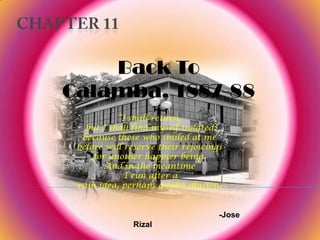Chapter11 110730051351-phpapp01
- 1. Back To Calamba, 1887-88 ŌĆ£I shall return, but I shall find myself isolated; because those who smiled at me before will reserve their rejoicings for another happier being. And in the meantime I run after a vain idea, perhaps a false illusion.ŌĆØ -Jose Rizal
- 2. RIZAL was a true Filipino. All the alluring beauties of foreign countries and all the beautiful memories of his sojourn in alien lands could not make him forget of home nor turn his back to his own nationality. True that he studied abroad, acquired the lore and languages of foreign nations, and enjoyed the friendship of many great men of the Western world; but he remained at heart a true Filipino with an unquenchable love for the Philippines and an unshakeable determination to die in the land of his birth.
- 3. THUS, AFTER FIVE YEARS OF MEMORABLE SOJOURN IN EUROPE, HE RETURNED TO THE PHILIPPINES IN AUGUST, 1887. HE PRACTISED MEDICINE IN CALAMBA. HE OPERATED SUCCESSFULLY ON HIS MOTHERŌĆÖS EYES AND LIVED THE QUIET LIFE OF A COUNTRY DOCTOR. UNFORTUNATELY HIS ENEMIES, WHO RESENTED NOLI, PERSECUTED HIM, EVEN MENACING HIS LIFE.
- 4. DECISION TO RETURN HOME ...after the publication of the Noli Me Tangere Rizal was warned not to return home by: *Paciano (his brother) *Sivestre Ubaldo (his brother-in-law) *Chengoy (Jose M. Cecilio) *Other Friends
- 5. REASONS WHY HE WAS DETERMINE TO RETURN TO THE PHILIPPINES: ŌĆó to operate on his motherŌĆÖs eyes ŌĆó to serve his people who had long been oppressed by Spanish tyrants ŌĆó to find out for himself how the Noli and his other writings were affecting Filipinos and Spaniards in the Philippines; and ŌĆó to find out why Leonor Rivera had remained silent.
- 6. DELIGHTFUL TRIP AND ARRIVAL TO MANILA
- 7. HAPPY HOMECOMING On August 8th, the two days after his arrival in Manila, he reached Calamba. His family welcomed him affectionately, with plentiful tears of joy. Paciano did not leave him during the first days after arrival to protect him from enemy assault. Rizal, who came to be called ŌĆ£Doctor UlimanŌĆØ because he came from Germany. He was able to earn $900 as a physician Rizal opened a gymnasium for young folks.
- 8. STORM OVER THE ŌĆ£N░┐│ó▒§ŌĆØ
- 9. THE ARCHBISHOP OF MANILA, MSGR. PEDRO PAYO (A DOMINICAN), SENT A COPY OF THE NOLI TO FATHER RECTOR GREGORIO ECHAVARRIA OF THE UNIVERSITY OF SANTO TOMAS FOR EXAMINATION BY A COMMITTEE OF THE FACULTY. *(THERE WERE NO MASS IMPRISONMENT OR MASS EXECUTION OF FILIPINOS. HE REFUSED TO BE INTIMIDATED BY THE FRIARS WHO CLAMORED FOR POSITIVE REPRESSIVE MEASURES AGAINST PEOPLE CAUGHT READING THE NOVEL AND VINDICTIVE ACTION AGAINST ITS AUTHOR.) BECAUSE OF GOV.GEN.TERERO
- 10. DEFENDERS OF NOLI Marcelo H. Del Pilar- editor of La Solidaridad -he published a pamphlet entitled ŌĆ£Caiigat CayoŌĆØ Caiigat Cayo- it means ŌĆ£Be slippery as an EelŌĆØ Father Francisco Sanchez- RizalŌĆÖs beloved Jesuit professor Don Segismundo Moret- a former President of the Council of Minister -he read and like the book very much. Rev. Vicente Garcia- a Filipino Catholic priest-scholar, a theologian of the Manila Cathedral and a Tagalog translator of the famous Imitation of Christ by Thomas A Kempis Father Garcia- writing under the pen name Justo Desiderio Magalang -he wrote a defense of the Noli which was published in Singapore as an appendix to a pamphlet dated on July 18, 1888.
- 11. RIZAL AND ANDRADE Lt. Jose Taviel de Andrade- a Spanish bodyguard, -he was assigned as a bodyguard of Rizal by Governor-General Terrero - between Lt. Andrade and Rizal, a beautiful friendship bloomed. CalambaŌĆÖs Agrarian Trouble - Governor-General Terrero, influenced by a certain facts in Noli Me Tangere, ordered a government investigation of the friars estates to remedy whatever iniquities might have been presents in connection with land taxes and with tenant relations.
- 12. A POEM FOR LIPA Before Rizal left Calamba in 1888 his friend from Lipa requested him to write a poem in commemoration of the townŌĆÖs elevation to a villa (city), by virtue of the Becerra Law of 1888. He wrote a poem this was the Himno Al Trabajo (Hymn to Labor). He finished it and sent to Lipa before his departure from Calamba.












